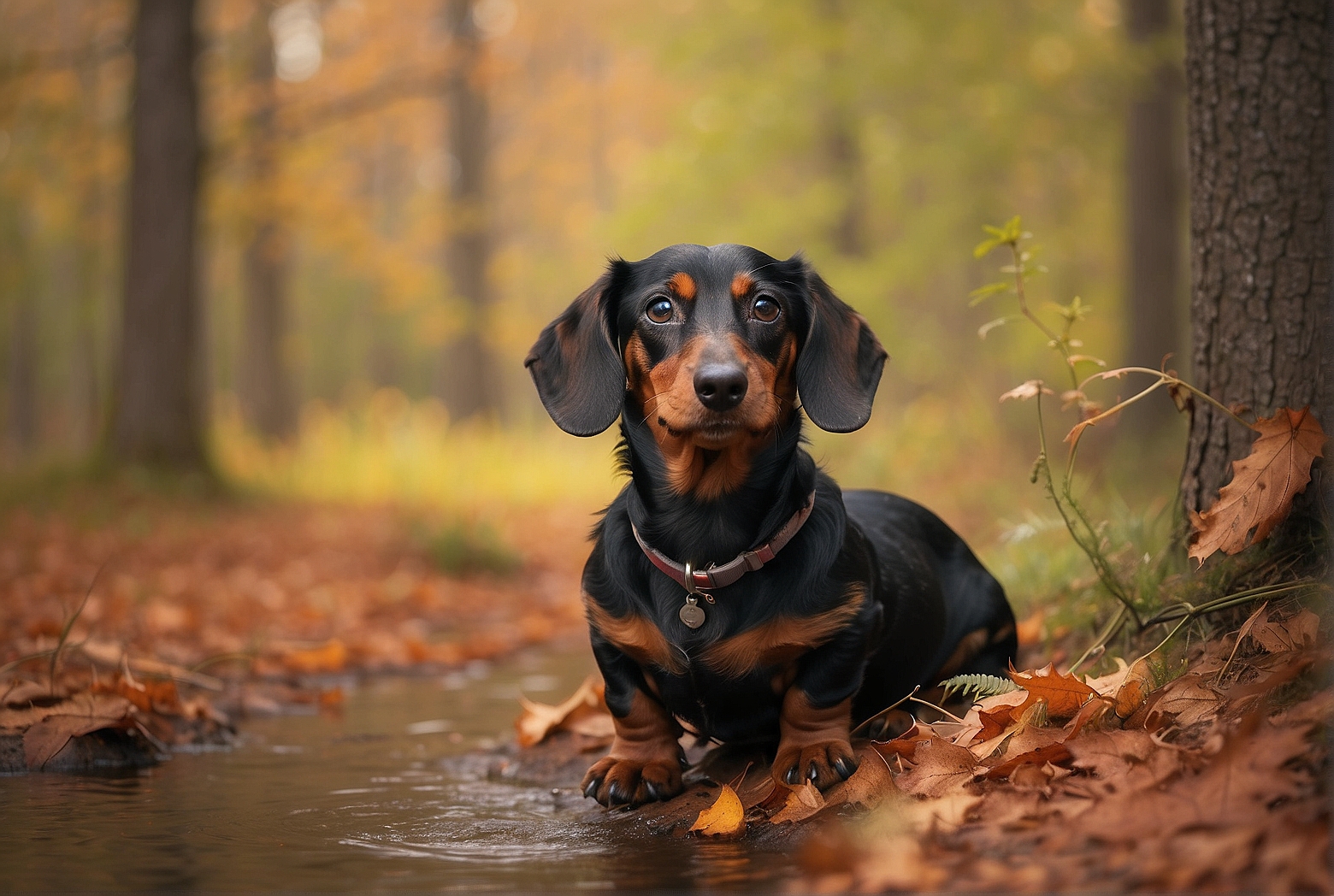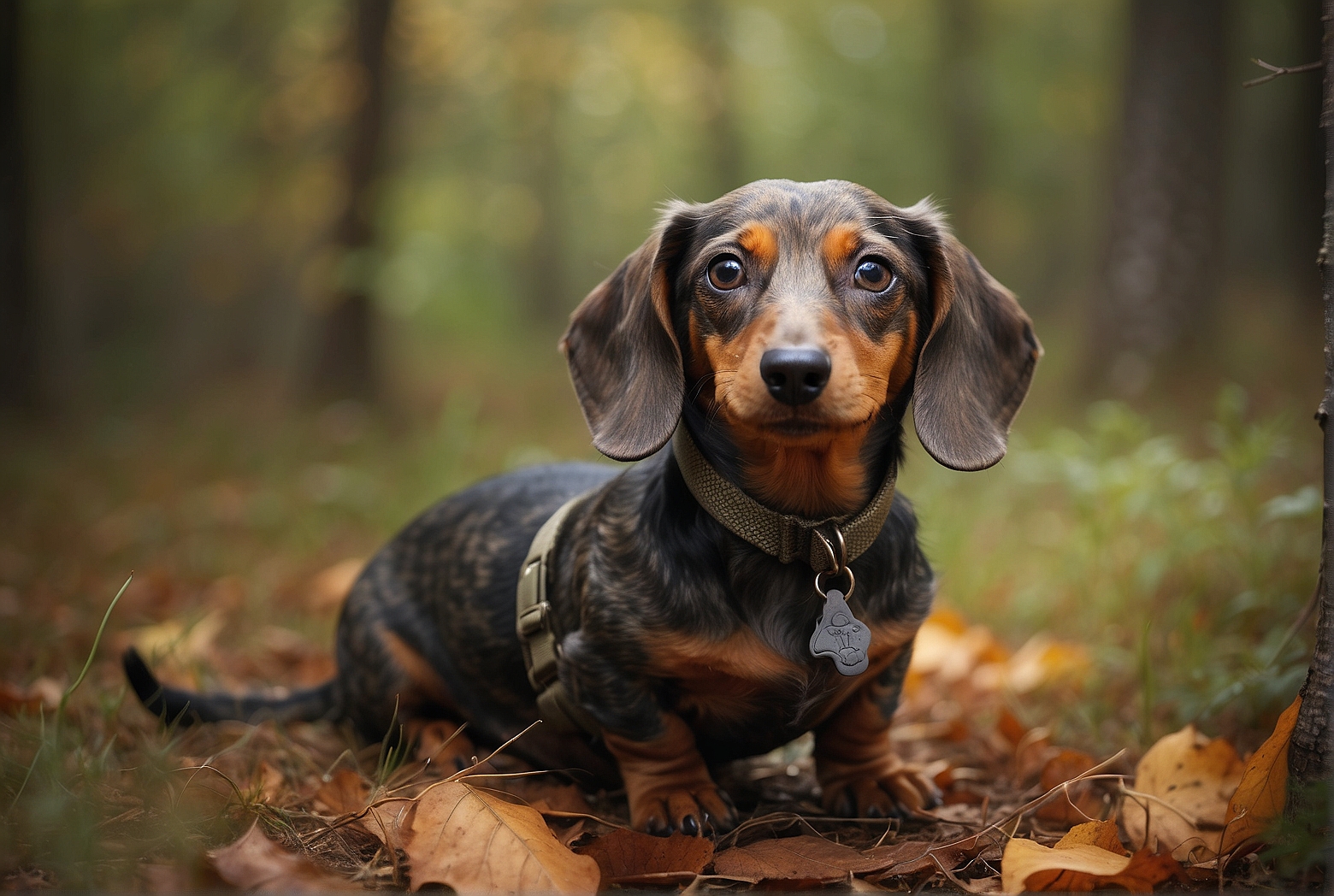Last Updated on April 17, 2024 by admin
Have you ever wondered about the hunting habits of dachshunds? These small and adorable dogs may not seem like natural hunters, but they have a fascinating history rooted in their hunting abilities. Originating from Germany, dachshunds were bred to chase and hunt small game such as badgers. This article will explore the intriguing hunting instincts of dachshunds and shed light on what exactly these determined little dogs hunt. Prepare to be amazed by the extraordinary abilities of dachshunds as we uncover the secrets of their hunting habits.
Dachshunds as Hunting Dogs
Introduction to Dachshunds as Hunting Dogs
Dachshunds, also known as wiener dogs or sausage dogs, may be small in stature, but they have a rich history as skilled hunting dogs. Bred specifically for their hunting abilities, these courageous and determined canines were originally developed in Germany in the 17th century. Today, dachshunds continue to showcase their exceptional hunting instincts and unique characteristics on the hunting grounds.
History of Dachshunds as Hunting Dogs
The history of dachshunds as hunting dogs traces back to their origin in Germany. These versatile dogs were initially bred to assist in hunting game such as badgers, foxes, and other burrow-dwelling animals. With their low-to-the-ground physique, elongated bodies, and strong sense of smell, dachshunds proved to be well-suited for the challenging task of flushing out prey from their hiding places. Over time, they gained popularity as hunting dogs not only in Germany but also in various parts of Europe and the United States.
Unique Characteristics for Hunting
Dachshunds possess several unique characteristics that make them excellent hunting companions. Their elongated bodies, short legs, and muscular build are specifically designed to maneuver through tight spaces and burrows, allowing them to reach game in hard-to-reach areas. Additionally, their distinctive front paws, which are slightly turned outward, provide them with efficient digging abilities. These physical attributes, combined with their keen sense of smell, exceptional tracking skills, and fierce determination, contribute to their prowess as hunting dogs.

Different Types of Dachshunds for Hunting
There are three main types of dachshunds distinguished by their coat varieties: smooth-haired, wire-haired, and long-haired. Each type has its own advantages and characteristics that contribute to their effectiveness as hunting dogs.
Smooth-haired dachshunds are known for their sleek and shiny coats, which are low-maintenance and resistant to the elements. Their smooth coats make it easier for them to navigate through dense underbrush while hunting. Wire-haired dachshunds, on the other hand, have a coarse and wiry double coat that provides protection from thorns and rough terrain. Their coats also make them more adept at withstanding harsh weather conditions. Finally, long-haired dachshunds have elegant and flowing coats that require more grooming but provide them with additional insulation during colder seasons.
Each type of dachshund brings its own set of advantages to different hunting environments and terrains, allowing hunters to choose the most suitable companion for their needs.
Hunting Instincts and Abilities
Overview of Hunting Instincts
Dachshunds have an innate hunting instinct that has been carefully preserved throughout their breeding history. These instincts are deeply rooted in their DNA and are the driving force behind their natural hunting abilities. From their acute sense of smell to their burrowing and tracking skills, dachshunds are perfectly equipped to excel in hunting.

Scent Hounds: Dachshunds’ Exceptional Sense of Smell
One of the most remarkable hunting abilities of dachshunds is their exceptional sense of smell. With approximately 125-300 million scent receptors, dachshunds possess one of the keenest olfactory systems among dog breeds. This remarkable sense allows them to track scents and detect game over long distances. Whether it’s following a trail or locating the scent of hidden prey, their sense of smell is crucial in their hunting endeavors.
Burrowers: Dachshunds’ Ability to Locate and Flush Out Prey
Dachshunds were specifically bred to hunt and flush out burrow-dwelling prey. Equipped with a tenacious temperament and their unique long and narrow bodies, these dogs have the ability to enter narrow tunnels and navigate underground lairs with ease. They use their powerful digging instincts to locate and flush out game like badgers, rabbits, and foxes from their dens. Their compact size, combined with their determination and agility, makes them excellent at traversing through intricate underground networks where larger dogs would struggle to access.
Tracking: Dachshunds’ Expertise in Tracking Down Game
Tracking is another area where dachshunds excel on the hunting field. With their acute sense of smell and an innate ability to follow scent trails, they are highly proficient at tracking down game even in challenging terrains. Their keen noses allow them to pick up and distinguish the faintest odors left behind by prey, enabling hunters to effectively pursue their targeted game.
Barking: Dachshunds’ Vocal Communication in Hunting
Barking plays a significant role in a dachshund’s hunting behavior. These intelligent dogs use their distinctive bark to communicate with their human companions during hunts. By barking, they can signal the presence of game, alert hunters to potential danger, or indicate that they have successfully located or cornered their target. This vocal communication helps create a strong bond between the hunter and the dachshund, ensuring a smooth and cooperative hunting experience.
Prey Selection and Targeted Game
Dachshunds’ Prey Selection
Dachshunds have a natural inclination for hunting small to medium-sized game. They were initially bred to hunt badgers, foxes, and rabbits, with a particular specialization in burrowing game. Their instincts drive them to chase, pursue, and capture animals that take refuge in holes or underground dens. While their primary prey selection includes burrow-dwelling animals, dachshunds can also adapt their hunting skills to other types of game, depending on their size, weight, and training.
Traditional Game for Dachshunds
Throughout history, dachshunds have been primarily used for hunting badgers, foxes, and rabbits. These animals have always been the traditional game for dachshunds due to their natural tendency to take cover underground. Badgers, with their strong and aggressive nature, require a particularly determined dachshund to flush them out of their underground burrows. Foxes and rabbits, on the other hand, rely on their speed and agility, requiring dachshunds to use their tracking and pursuit abilities effectively.
Size and Weight Considerations
When considering the suitability of dachshunds for hunting, size and weight are important factors to consider. Dachshunds come in various sizes, ranging from miniature to standard. While all sizes possess hunting instincts, the larger standard dachshunds are better equipped to handle larger game such as badgers. The miniature dachshunds, on the other hand, are more adept at hunting smaller game like rabbits and foxes. It is essential to match the dachshund’s size to the specific game being pursued to ensure a successful and ethical hunting experience.
Hunting Techniques for Different Game
Dachshunds employ a range of hunting techniques depending on the game they are pursuing. When hunting burrow-dwelling animals like badgers, dachshunds utilize their digging and tunneling skills to locate and flush out the prey from their dens. They use their front paws to dig through the earth and their elongated bodies to maneuver through tight spaces. For tracking game such as foxes and rabbits, dachshunds rely on their exceptional sense of smell and tracking abilities to follow scent trails and effectively pursue their quarry. The specific hunting techniques employed may vary depending on the targeted game and the dachshund’s individual training and instincts.
Cooperative and Solo Hunting
Cooperative Hunting: Dachshunds in Packs
While dachshunds are often associated with solo hunting, they can also be effective when hunting in packs. Cooperative hunting involves two or more dachshunds working together to pursue, flush out, and corner game. When hunting in packs, dachshunds can coordinate their efforts, communicate through barking, and strategically surround the prey, increasing the chances of success. This form of hunting can be particularly beneficial when pursuing larger game or in situations where the terrain requires the combined efforts of multiple dachshunds.
Advantages and Roles in Cooperative Hunting
Cooperative hunting offers several advantages for dachshunds. Firstly, working in a pack allows them to leverage each other’s strengths and compensates for individual weaknesses. For instance, one dachshund may excel at tracking while another may be more proficient at digging or cornering prey. By collaborating, dachshunds can optimize their hunting abilities and increase their chances of a successful hunt. Additionally, cooperative hunting provides social interaction and strengthens the bond between pack members, creating a cohesive and efficient hunting team.
Solo Hunting: Dachshunds as Independent Hunters
While cooperative hunting is a viable option, dachshunds are also highly capable of hunting independently. Their courage, determination, and self-reliance enable them to pursue game on their own, exhibiting their natural instincts and honing their hunting skills. Solo hunting allows dachshunds to apply their individual strengths and adapt their hunting techniques based on the specific game and environment. It provides them with opportunities for personal growth, mental stimulation, and an avenue to express their innate hunting aptitude.
Benefits and Challenges of Solo Hunting
Solo hunting presents both benefits and challenges for dachshunds. One advantage is the freedom and autonomy it offers. Solo hunters can tailor their approach, focus on their preferred game, and adapt their methods to the situation at hand. This independence allows them to develop a deeper understanding of their prey and sharpen their hunting skills. However, solo hunting also poses challenges, as dachshunds must rely solely on their own abilities and instincts. They must be prepared to face any obstacles or dangers without the support of other dogs. Careful training, socialization, and monitoring are essential to ensure their safety and well-being.
Training and Socialization for Cooperative and Solo Hunting
Whether dachshunds are taking part in cooperative hunting or engaging in solo hunts, proper training and socialization are vital. Training should begin with basic obedience commands such as sit, stay, and recall. As their hunting instincts are strong, it is important to channel their energy and teach specific commands that align with hunting behaviors. Socializing dachshunds from an early age helps them develop positive behaviors and good manners both in hunting and everyday situations. Proper socialization also ensures that they can effectively work with other hunting dogs if engaging in cooperative hunting.
Hunting Behaviors and Tactics
Scouting and Tracking
Scouting and tracking are integral parts of a dachshund’s hunting strategy. Before actively pursuing game, dachshunds engage in scouting to gather information about the terrain, potential prey, and any other relevant factors. They rely on their senses, observational skills, and previous hunting experiences to assess the environment. Once they have identified a potential target, they switch to tracking mode and follow scent trails left behind by the game, using their exceptional sense of smell to guide them.
Scent Trail Following
Following scent trails is a key ability of dachshunds when tracking down game. Their olfactory prowess allows them to discern and follow scent molecules left by animals, leading them closer to their quarry. Dachshunds meticulously navigate the ground, analyzing and differentiating the various smells present. By focusing on the specific scent of the target game, they can effectively pursue and locate their prey. Scent trail following requires concentration, perseverance, and the ability to distinguish between scents, allowing dachshunds to stay on the right track.
Digging and Tunneling
Dachshunds’ remarkable digging and tunneling abilities are crucial for hunting burrow-dwelling animals. These skills enable them to uncover prey hiding underground and force them out into the open. Using their strong front paws, dachshunds methodically dig through the earth, creating tunnels to reach game that would otherwise be inaccessible. Their elongated bodies and tenacious nature allow them to navigate the narrow tunnels and execute their hunting strategy effectively.
Flush Out and Chase
Once dachshunds have successfully located their prey, their instinct is to flush them out from their hiding places. They use a combination of barking, digging, and agility to encourage the game to emerge, making it vulnerable to chase and pursuit. By skillfully maneuvering around the burrow or the immediate surroundings, dachshunds compel the prey to flee, triggering a thrilling chase. Their speed and determination ensure that the game is unable to outpace them, allowing hunters to close in for a successful capture.
Alerting and Barking
Barking is an essential part of a dachshund’s hunting behavior. When they detect the presence of game, spot potential dangers, or signal a change in the hunting situation, dachshunds use their distinctive and resounding bark to communicate with their human companions. This vocalization serves as an alert, indicating the need for attention, immediate action, or a change in hunting strategy. Effective communication through barking ensures a strong bond between the dachshund and the hunter, allowing for effective teamwork and coordination.
Cornering and Holding Prey
As dachshunds pursue their quarry, their ability to corner and hold prey becomes significant. Cornering the game involves strategically positioning themselves to limit the escape routes and restrict the prey’s movements. By keeping the prey contained within a confined space, dachshunds prevent it from evading capture and maintain control of the situation. This behavior requires a combination of agility, quick thinking, and a fearless attitude to successfully outmaneuver the game and keep it within the hunter’s range.
Retrieving and Dispatching
Once the prey has been captured, dachshunds may be tasked with retrieving and dispatching it. Depending on the game being pursued, this may involve dachshunds gently carrying the game back to the hunter without causing harm, or in the case of smaller prey, simply signaling the location to the hunter. When dispatched by the hunter, the dachshund’s role is to swiftly seize the opportunity and secure the game, preventing it from escaping or causing unnecessary suffering.
Adapting Tactics to Different Prey and Environments
Dachshunds exhibit remarkable adaptability when it comes to hunting tactics. Their hunting strategies can vary depending on the specific prey being pursued and the environment in which they are hunting. Whether it’s navigating underground burrows, chasing through dense forests, or pursuing across open fields, dachshunds demonstrate versatility and resourcefulness in adapting their tactics to suit the situation. They quickly assess the circumstances, skillfully adjusting their approach to maximize their chances of a successful hunt.
Training Dachshunds for Hunting
Start with Basic Obedience Training
Before embarking on hunting training, it is crucial to establish a foundation of basic obedience training for dachshunds. This includes commands such as sit, stay, recall, and heel. Basic obedience training helps to develop the necessary discipline, focus, and control required for successful hunting. It creates a framework within which additional hunting-specific commands and behaviors can be introduced and reinforced.
Expose to Hunting Environments and Scenarios
To prepare dachshunds for hunting, gradually expose them to hunting environments and scenarios. Introduce them to varied terrains such as forests, fields, and areas resembling burrow environments. Allow them to become familiar with different smells, sounds, and visual cues associated with hunting. Regular exposure builds confidence, stimulates their hunting instincts, and prepares them for the challenges they will encounter in real hunting situations.
Introduce Scent Training
Given dachshunds’ exceptional sense of smell, incorporating scent training into their hunting preparation is essential. Begin by introducing them to scent targets such as rabbit or fox scents. Gradually progress to more advanced scent trails and exercises, simulating real hunting scenarios. Encourage them to follow the scent trails, rewarding their successful efforts. Scent training hones their olfactory abilities and reinforces their tracking instincts, enabling them to effectively locate and pursue game.
Teach Commands for Hunting Behaviors
Specific hunting commands are crucial in training dachshunds for hunting. Commands such as “search,” “track,” “flush,” and “retrieve” are essential tools for communicating and coordinating with the dachshund in the field. Teach these commands gradually, using positive reinforcement techniques, and ensure consistency in their application. By associating these commands with specific hunting behaviors, dachshunds can learn to perform more effectively and become reliable partners during the hunt.
Socialize with Other Hunting Dogs
Socialization with other hunting dogs is beneficial for dachshunds preparing for cooperative hunting. It allows them to develop social skills, learn to work together, and understand the dynamics of a hunting pack. Encourage positive interactions and supervised play sessions with other hunting dogs to enhance their cooperative abilities. Socialization helps create a cohesive and well-coordinated hunting team, fostering better communication and shared objectives.
Consistency and Positive Reinforcement
Consistency is key when training dachshunds for hunting. Establish clear expectations, consistently apply commands, and reward desired behaviors with positive reinforcement. Praise, treats, and playtime can serve as powerful motivators to encourage and reinforce hunting instincts. Building a strong bond based on trust and respect with your dachshund is essential for effective training and a successful hunting partnership.
Work with Professional Trainers if Needed
For individuals new to hunting or those seeking additional guidance, working with professional trainers can be highly beneficial. Experienced trainers can provide expert advice, tailored training plans, and hands-on guidance to help maximize the hunting potential of dachshunds. They can assess the dog’s abilities, identify areas for improvement, and provide specialized training techniques to enhance their hunting skills. Professional trainers offer a wealth of knowledge and expertise to ensure an optimal hunting experience for both dachshund and hunter.
Safety and Ethics in Dachshund Hunting
Know Local Hunting Regulations and Laws
Before engaging in dachshund hunting, it is essential to familiarize yourself with local hunting regulations and laws. Obtain the necessary hunting permits, licenses, and abide by any restrictions or seasonal regulations. Stay informed about hunting seasons, bag limits, and any specific rules governing the use of dachshunds in hunting. Adhering to these regulations ensures ethical hunting practices, preserves the environment, and promotes responsible engagement in the sport.
Proper Gear and Protection for Dachshunds
Ensuring the safety and well-being of dachshunds during hunting is of utmost importance. Provide them with appropriate gear and protection to prevent injuries and potential hazards. This includes fitting them with a properly sized hunting vest or jacket for visibility, protective boots to shield their paws, and appropriate collars or harnesses. Additionally, consider using GPS tracking devices to locate and monitor your dachshund during hunts, further enhancing their safety.
Health and Veterinary Considerations
Maintaining the health and well-being of dachshunds is crucial for their performance and enjoyment in hunting. Regular veterinary check-ups, vaccinations, and preventive treatments for parasites are essential to ensure their overall health. Additionally, take precautions to prevent overheating or dehydration during hunting excursions, especially in warmer climates. Provide access to clean drinking water and schedule regular breaks to rest and recover. The dachshund’s overall health directly influences their hunting capabilities, making proper care and well-being priorities.
Responsible Game Harvesting
Ethical hunting practices involve responsible game harvesting. When a dachshund successfully captures game, it is crucial to dispatch it quickly and humanely to minimize suffering. Practice appropriate techniques to effectively and ethically handle the game, ensuring a swift and painless process. Following responsible game harvesting guidelines promotes animal welfare, exhibits respect for the hunted animal, and upholds the values of ethical hunting.
Lifelong Commitment to Training and Care
Commitment to ongoing training and care is imperative for dachshunds engaged in hunting activities. Regular training sessions, maintenance of hunting skills, and reinforcement of commands are necessary to keep their hunting abilities sharp. Additionally, provide them with appropriate exercise, mental stimulation, and a balanced diet to support their overall well-being. The commitment to maintaining their hunting skills, physical fitness, and mental alertness contributes to a fulfilling and enjoyable hunting experience for both dachshund and owner.
Hunting as a Recreational Activity for Dachshunds
Enjoyment and Mental Stimulation for Dachshunds
Engaging dachshunds in hunting activities provides them with a unique recreational activity that aligns with their natural instincts. Hunting fulfills their innate desire to track, pursue, and capture prey, offering them immense enjoyment and mental stimulation. Participating in hunting activities can significantly contribute to a dachshund’s physical and mental well-being, helping prevent boredom and fostering healthy, happy companionship.
Bonding between Owners and Dachshunds
Hunting activities strengthen the bond between owners and dachshunds. The shared experiences, teamwork, and communication inherent in hunting foster a deep connection and understanding between humans and their canine hunting partners. This cooperation in the field builds trust, loyalty, and mutual respect, creating a strong relationship that extends beyond hunting endeavors.
Hunting Challenges and Competitions
For dachshund owners seeking additional challenges or opportunities to showcase their dachshunds’ hunting abilities, hunting competitions offer an exciting outlet. These competitions evaluate the dachshund’s hunting skills, obedience, and overall performance, providing a platform to demonstrate their prowess. Competing in hunting trials can be a thrilling experience, allow dachshund owners to network with others who share a passion for hunting, and offer opportunities for growth and improvement.
Alternatives for Urban Dachshunds
For urban dachshunds or those in areas where traditional hunting opportunities are limited, alternative forms of hunting or activities can help satisfy their hunting instincts. Engaging in scent detection activities, such as urban tracking or nose work, can provide mental stimulation and tap into their keen sense of smell. Participating in organized lure coursing events, where dachshunds chase mechanical lures, can also simulate the thrill of a hunt within a controlled setting.
Other Activities to Satisfy Hunting Instincts
In addition to hunting-specific activities, there are various other ways to satisfy a dachshund’s hunting instincts. Engaging them in interactive play, such as tug-of-war or retrieving games, allows them to channel their natural prey drive. Puzzle toys and treat-dispensing devices can provide mental stimulation and mimic the challenge of foraging for food. Regular exercise, exploration of new environments, and engaging in scent-driven activities are all beneficial for satisfying their hunting instincts and promoting a healthier, happier dachshund.
Conclusion
Dachshunds’ hunting heritage runs deep, and they continue to exhibit exceptional hunting instincts and abilities to this day. From their remarkable sense of smell and burrowing skills to their tracking expertise and vocal communication, dachshunds possess a unique set of characteristics that make them versatile and valuable hunting companions. Whether engaging in cooperative hunting or pursuing game independently, dachshunds demonstrate their adaptability, courage, and determination in the field. By understanding their prey selection, training needs, and the ethics surrounding hunting, dachshund owners can appreciate and respect their breed’s heritage and instinctual abilities. Embracing hunting as a recreational activity opens up a world of enjoyment, bonding, and fulfillment for both dachshund and owner, showcasing the remarkable relationship between humans and their dedicated hunting companions.




